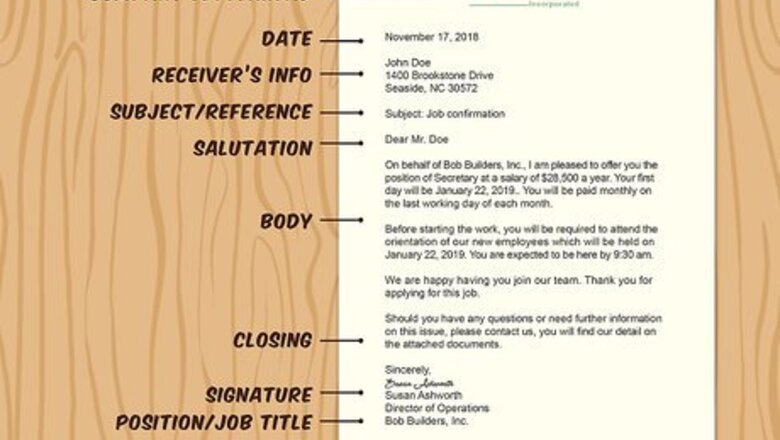
views
Confirming an Employment Offer

Use business letter format on company letterhead. A formal business letter on company letterhead sets the appropriate tone and establishes the letter as official business communication. Set a standard font and margins, typing the body of the letter in block-paragraph style – single-spaced, with a double-space between paragraphs. Avoid using any abbreviations when you type addresses in formal business letters. For example, instead of typing "123 Main St.," you would type "123 Main Street." If your letterhead includes the address for your business, you can typically eliminate the address block for yourself.Tip: Government and small business agencies may have templates you can download for free that cover all the legal requirements for a formal offer of employment letter.
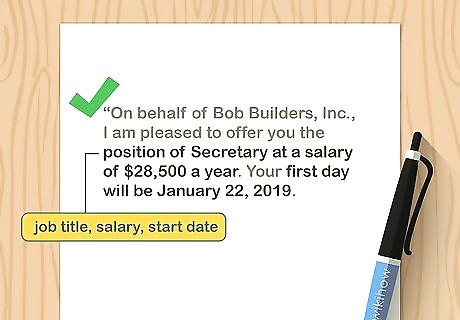
List the job title, salary, and start date. Begin your letter with an enthusiastic tone, welcoming the recipient to the company in their new capacity. You might also include a brief summary of the recipient's job duties unless the job title makes them obvious. For example, you might write: "On behalf of Bob Builders, Inc., I am pleased to offer you the position of Secretary at a salary of $28,500 a year. Your first day will be January 22, 2019."
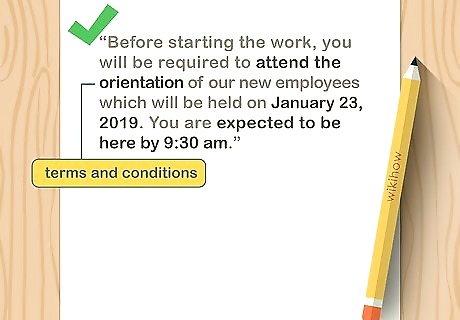
Summarize the terms and conditions of the offer. If there are any limitations to your offer they should be clearly stated. Additionally, if the offer is contingent on anything, those contingencies should be stated up front. For example, the offer may be contingent on a clean background check, or a clean drug test. This section may also include any documents the new employee needs to sign, such as a confidentiality agreement or a non-compete agreement. If you include any contingencies, provide the new employee with a deadline by which those things need to be completed. If you're only asking for documents to be signed, you might state that those documents can be signed on the new employee's first day.
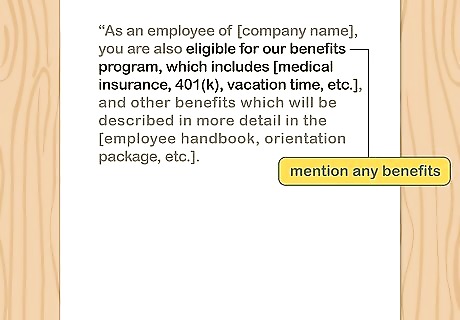
Provide details about any benefits your company offers. If your company offers health insurance, retirement benefits, educational assistance, paid time off, or other benefits, list those briefly. Let the new employee know when they will be eligible for those benefits, and how they can find out more information about them. Some employers start benefits at day one, but most require employees to work 60 or 90 days before they become eligible for benefits.Tip: While an employment confirmation letter may end up being more than one page, try to make it no longer than two pages. Remove details that the recipient can find on other documents they receive.
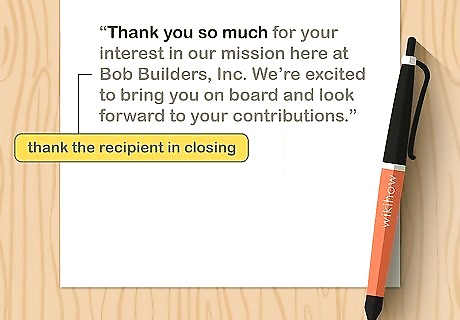
Close by thanking the recipient. Let the recipient know that you're grateful for their interest in your company and that you're glad they're coming to work with you. Communicate your excitement or enthusiasm for having the new employee join your team. For example, you might say "Thank you so much for your interest in our mission here at Bob Builders, Inc. We're excited to bring you on board and look forward to your contributions." Use a formal closing immediately before your signature, such as "Sincerely" or "Sincerely yours."
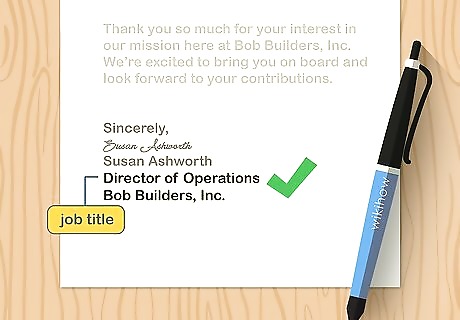
Include your job title under your name. The business letter template provides 4 blank lines for your signature after the formal closing. Under that space, type your first and last name. Under your name, type your job title and the name of the company. For example, you might type "Director of Operations, Bob Builders, Inc."
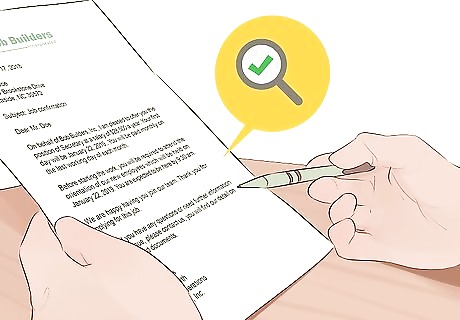
Proofread your letter carefully. Make sure your letter is free of any typos and spelling or grammatical errors. You may also want someone from human resources to read over the letter and verify that all the content is correct. Double-check numbers in particular. It's easy to transpose digits by mistake, and this can lead to a huge misunderstanding. These types of mistakes could also have legal consequences.

Print and sign your letter for mailing. Your letter will look more professional if printed on quality paper. Even if you send an email confirmation, mail an official signed copy as well. Sign the letter in the space provided, using blue or blank ink. Include any credentials, such as "CPA" or "JD," if appropriate. Mail the letter promptly, so that your new employee will receive it well before their planned start date.Tip: It also looks more professional to type the envelope. Most word-processing apps have templates you can use to place the addresses correctly on the envelope.
Writing a Catholic Confirmation Letter

Start with a statement about the importance of confirmation. The sacrament of Confirmation deepens baptismal grace, strengthening the bond between the confirmand and the Church. Address the confirmand personally, and congratulate them for taking this step and receiving this sacrament. For example, you might say "As you prepare to receive the sacrament of Confirmation, I am honored to support you as you take this important step to deepen your bond with Christ and the Church." Use words and phrases from the Catholic Catechism to stress the importance of this step in the confirmand's journey of faith.
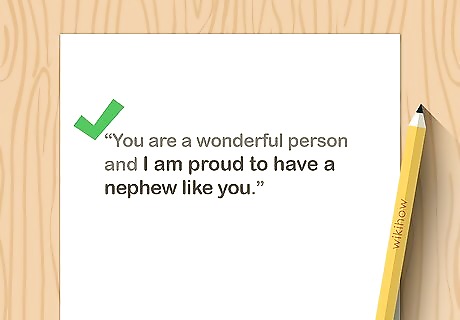
Discuss your relationship with the recipient. Use shared memories and experiences to encourage and build up the confirmand. Supplement your stories with verses from Scripture or other sources. Choose stories or events that demonstrate your love for the recipient and their journey in the faith. For example, you might discuss memories of when the recipient was baptized. Questions the recipient may have asked you about the Church or about your faith are also good jumping-off points for reflection. Don't worry about making this long or overly detailed. Brevity can also be powerful.Tip: It may help to outline your letter before you start writing it. Be prepared to go through several drafts to get it right.
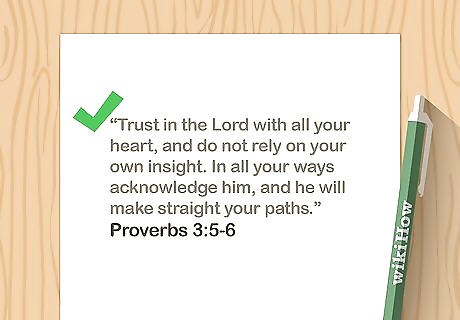
Include encouraging or inspirational quotes from Scripture. Use quotes to further express the meaning of the sacrament and the teachings of the Church. You can search online or use the Bible's concordance to find quotes that resonate with you. For example, you might try "The name of the Lord is a strong tower; the righteous run to it and are safe." (Proverbs 18:10). Another encouraging quote is "For I know the plans I have for you, says the Lord, plans for welfare and not for evil and not for harm, to give you a future with hope." (Jeremiah 29:11). You might also try "I can do all things through Christ who strengthens me." (Philippians 4:13).

Assure the recipient that they have your support. Close your letter by letting the recipient know that you support them on their journey and are praying for them. Thank the recipient for being in your life and bringing you love and joy. For example, you might write "I am extremely proud of you, and all the blessings you have brought to my life. I am honored to be your Confirmation sponsor, and pray that you will continue to grow in faith, hope, and charity."Variation: If you know the recipient's confirmation name, you might close your letter with a prayer to that saint.
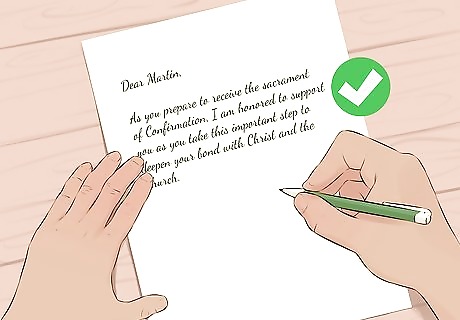
Write your final letter by hand to make it more personal. Formal letters are typically typed. However, a handwritten confirmation letter feels more personal and authentic, as though it came straight from the heart. This can be a great touch to add. If you're going to write your letter by hand, go slowly. Write as neatly as possible, and make sure you aren't introducing any errors. It can help to type your letter out first and then copy it.
Drafting Other Formal Confirmation Letters
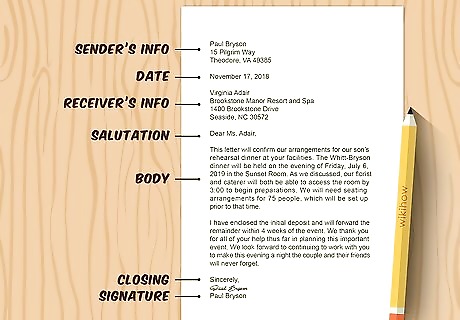
Type your letter in formal business letter format. A formal business letter communicates that you are serious and sets the proper tone for your letter. Most word processing apps include a business letter template that you can use to type your confirmation letter. Use a standard font, such as Times New Roman or Arial. In a legal sense, a confirmation letter also may be used to create a record of an agreement made orally. The formal business letter format is appropriate, as these letters may be used as evidence in court. Because confirmation letters are typically extremely brief, you may find that your letter only has a single paragraph. It should never be longer than a page.
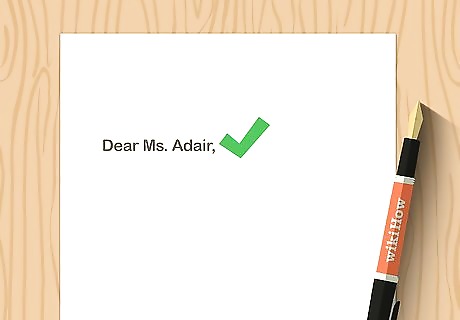
Use an appropriate salutation. Typically you'll start the salutation line with the word "dear," followed by "Mr." or "Ms." and the first and last name of the recipient of the letter. Place a colon at the end of the person's name to start the letter. If the person is a doctor, use "Dr." If you don't know the recipient's gender identity, simply use their first and last name. Don't use the abbreviation "Mrs." unless you know the recipient is a married woman who prefers that title.
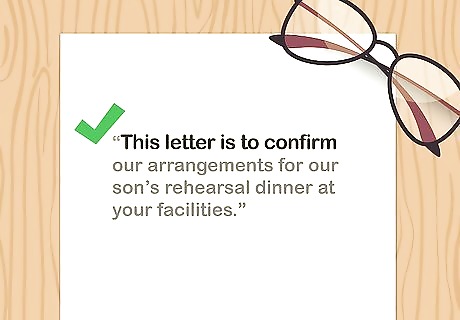
Confirm the specific arrangement made. There's no reason for any extended introduction or pleasantries in a confirmation letter. Get straight to the point of the event or arrangement you're confirming. This will likely include dates, times, and locations. For example, you might start the letter "This letter is to confirm" or "I am writing to confirm," followed by the information you're confirming. If you're writing to confirm receipt of something, you can start your letter "I am pleased to confirm," or "I was pleased to receive," followed by a list of the specific items you received.Err on the side of formality. You can be more personable when confirming a personal arrangement made with someone you know well. But generally, keep your tone formal and professional.
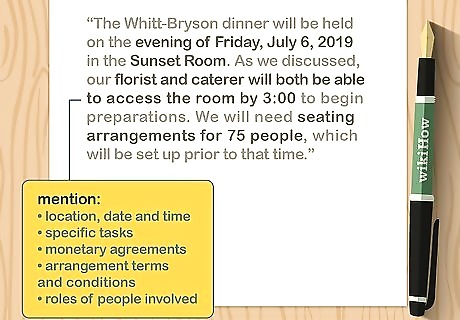
Include any other important information. Other details may include the names and roles of other people involved, specific tasks, conditions of the arrangement, or monetary agreements. Repeat any terms or conditions that were part of the agreement to clarify what is expected. For example, if you're writing to confirm that the recipient will volunteer at a nonprofit event, you might want to include the day, time, and location of the event, as well as specific acts the volunteer will be expected to perform.
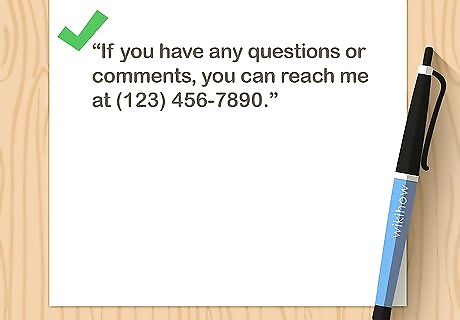
Ask for a follow-up if needed. Towards the end of your letter, let the recipient know if you need them to contact you and provide additional information. If your confirmation included a request or an assignment of responsibilities, ask them to confirm their agreement on those terms. Even if you don't have anything specific for the person to contact you about, it's usually a good idea to include a line with your preferred method of communication and let them know that they can contact you if they have any further questions. For example, you might write "If you have any questions or comments, you can reach me at (999) 444-1212."
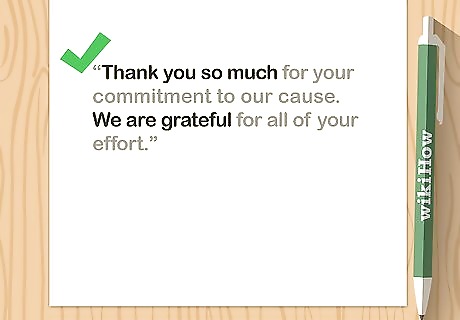
Thank the recipient. Start a new paragraph and add a line thanking the recipient for joining you in the arrangement or agreeing with you on the terms, whatever is appropriate to the subject of the letter. For example, if you are confirming someone's agreement to volunteer at a nonprofit event, you might say "Thank you so much for your commitment to our cause. We are grateful for all of your effort." Make a statement of your enthusiasm, if appropriate. For example, if you are writing to confirm a job interview, you might say "I appreciate the opportunity" or "I look forward to talking to you."
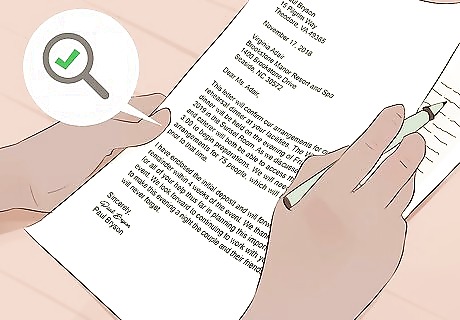
Edit and proofread your letter before printing. Your confirmation letter won't be taken seriously if it includes typos or grammatical errors. In addition to proofreading, make sure your writing is as clear and concise as it can be. Reading your letter aloud can help you pick up on places where your writing could be simpler and more direct, as well as making it easier to notice mistakes. Edit out legalese or other industry jargon. Be clear and direct about what you're confirming.
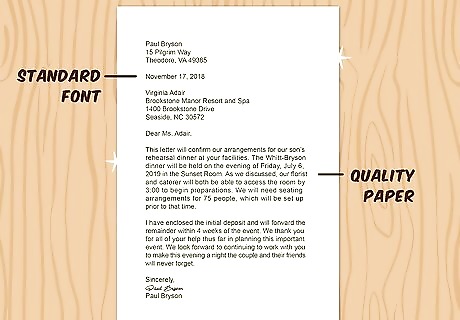
Print your letter on quality paper. Once you're confident your letter is error-free, print it on a premium, stationery paper. You can buy small quantities of this type of paper in office supply stores or online. If you're sending the letter in your capacity as an employee or representative of a business or organization, use the letterhead of that business or organization. However, if you're writing to confirm a personal matter, don't use the business letterhead – even if you own the business. Most word processing apps have templates you can use to create your own personal letterhead if you want your letter to look a little more polished.

Sign the letter using blue or black ink. After you've printed the letter, sign it neatly in the space you provided over your typed name. Try to keep your signature professional and reasonably legible, without being excessively stylistic. Sign your first and last name exactly as it is typed. It's typically not appropriate to use a nickname or abbreviation when signing a confirmation letter.
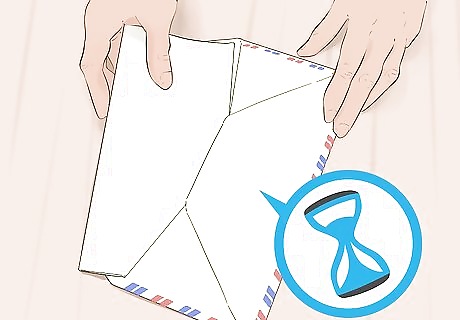
Send your letter to the recipient promptly. Try to get your letter in the mail the same day you sign it. You won't make a good impression if the date of your letter is several days before the date of the postmark. If the letter is confirming something that could possibly have legal significance, make a copy of the confirmation letter for your own records before you mail it.

















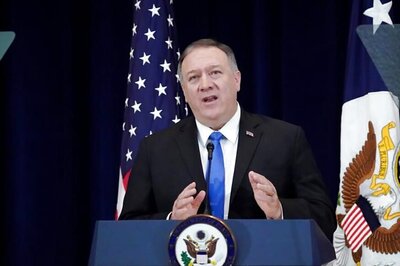


Comments
0 comment